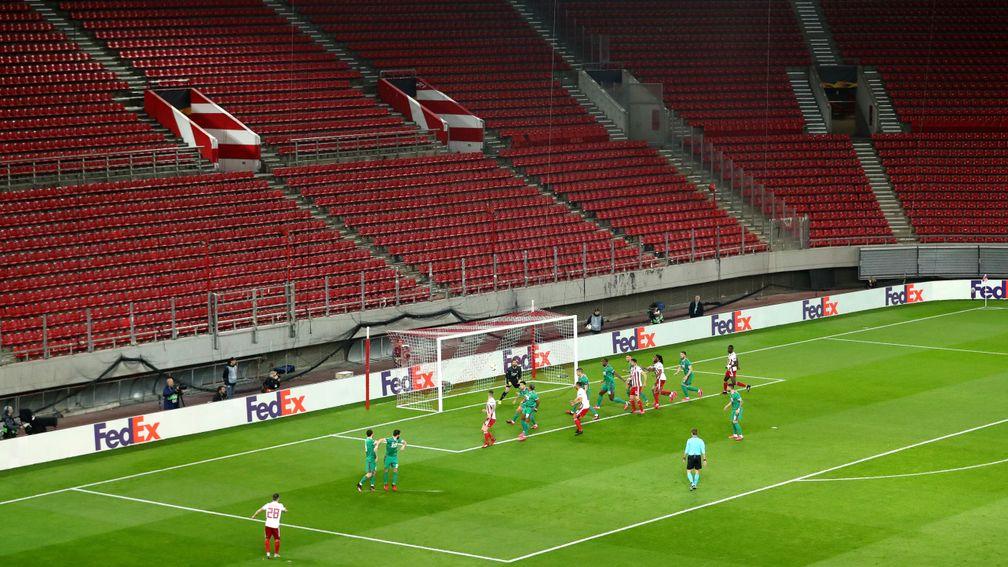- More
Adventurous play key to winning a fanless match | Thought for the week
More fabulous football philosophy and stats analysis from our soccer boffin

Before the fixtures programme was decimated for this weekend, matches were played or due to be played behind closed doors.
How different is a football match without fans? Obviously there is no atmosphere. But what else might change?
In normal circumstances teams win more often at home than away. My view is that this happens because teams play differently – a bit more adventurously at home, a bit more cautiously away. Not much, but enough to affect results. There is evidence of different approaches in various play-related stats.
Why do teams play differently depending on the venue? Probably because they feel different expectations.
This is subtly – and importantly – different from saying that ground advantage occurs because the crowd inspire home players and intimidate away players and the referee. If that were true then ground advantage would be worth more to teams with particularly hostile fans and/or a lot of fans. And it is not.
The open question is whether players will still feel different expectations of them when there are no fans. Away teams do not lose simply because of the home crowd, but if they think they do they might see the absence of the home crowd as an opportunity and then play more adventurously, which in turn would increase their chance of winning. It could become a self-fulfilling prophecy.
Away teams might do the right thing for the wrong reason. Other things being equal, attacking football is more effective than defensive football. There are certain circumstances in which retreat is the best policy. Usually, though, advance brings better rewards. When a team need to score near the end of a game and send more players into attack they become more likely to score and less likely to concede.
So the most enjoyable football to watch is also the most effective to play. Usually away teams do not get this.
Thought for the week
Aston Villa led Stoke 1-0 with only two minutes to go in a game in 1891. Then Stoke were awarded a penalty. Villa goalkeeper Bill Dunning kicked the ball out of the ground. In those days there was only one match ball. And the rules did not allow for any time to be added to the 90 minutes, which expired before the ball was retrieved. Villa won 1-0. Afterwards the rules were changed so that a referee could add time for a penalty to be taken.
This story is told in The Sunday Times Illustrated History of Football, which must have got it from somewhere else. It appears on Wikipedia, which cites The Sunday Times. It is the standard explanation for why stoppage time was introduced in football. I came across it while researching an article I wrote yesterday in The Assist. It is all over the internet.
I mention it here for two reasons. One, it seems to be well known. And two, it is probably not true.
There was no game between Villa and Stoke in 1891 that finished 1-0. There was a First Division game in October that Villa won 3-2 and another in November that they won 2-1. Some versions of the story say it was in the 2-1 game that Dunning unsportingly kicked the ball out of the ground. But Dunning did not play that day. Villa’s goalkeeper was Albert Hinchley. Dunning did not sign until July 1892.
According to Villa historian Frank Holt, newspaper match reports did not mention anyone kicking the ball out of the ground in either game. Would journalists, always on the lookout for a good story, have left out an incident so controversial that the rules had to be changed to stop it happening again?
Like us on Facebook RacingPostSport
Published on inKevin Pullein
Last updated
- This is what normally separates winners from losers in the Champions League
- Best Premier League summer transfers might not be who you think they are
- Kevin Pullein: How much will winning the title affect Liverpool?
- To discover how good Liverpool are we should consult the gods of ancient Egypt
- How much time-wasting is there in the Premier League and how can it affect bets?
- This is what normally separates winners from losers in the Champions League
- Best Premier League summer transfers might not be who you think they are
- Kevin Pullein: How much will winning the title affect Liverpool?
- To discover how good Liverpool are we should consult the gods of ancient Egypt
- How much time-wasting is there in the Premier League and how can it affect bets?